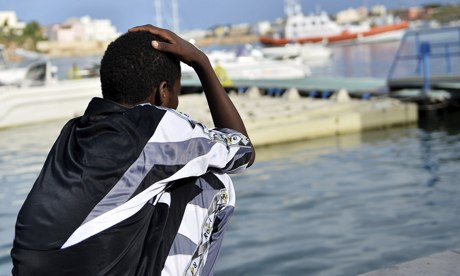Eritrean asylum seekers finally leave Italian island months after Mediterranean maritime tragedy that killed more than 300

Eritrean asylum seekers who survived disaster at sea only to be held in a reception centre on Lampedusa for more than 100 days have finally left the Italian island, with the UN condemning their extended stay as “not understandable and not acceptable”.
Carlotta Sami, a spokeswoman for the UN’s refugee agency, the UNHCR, in southern Europe said the agency had sent a letter of protest last week to judicial authorities in Sicily over what it said amounted to a prolonged detention of people in urgent need of assistance.
In one of the worst tragedies of its kind in the Mediterranean, more than 300 Eritreans died when the boat carrying them from Libya caught fire and sank off the coast of Lampedusa on 3 October.
Survivors were taken to the island’s centre for first assistance (CPA), a basic and often hugely overstretched first-tier reception centre where new arrivals are supposed to spend no longer than 48 hours.
In reality, asylum seekers often spend longer there, many of them sleeping outdoors during peak times for want of space.
But observers have been particularly angered by the length of time some survivors of 3 October were kept there, given the trauma they are likely to have suffered during and after the disaster.
The seven Eritreans who left the centre on Sunday, who include an 18-year-old woman “suffering psychological strain”, were willing to give witness testimony and were waiting to be heard by investigators, said Sami. They are scheduled to be heard by a judge in the southern Sicilian city of Agrigento on Monday.
Sami said: “[The CPA on] Lampedusa should be a centre where people stay for no more than 48 hours, and it is now structured that they stay there for many months.
“But in this case it is even less understandable and acceptable that those people, who have already suffered and risked losing their lives in such a tragic way, have been basically detained for all these months.”
The letter demanded that the Italian authorities ensure the situation never happens again. Six Syrian asylum seekers who also arrived in Lampedusa in October, meanwhile, are understood to still be at the centre.
The UNHCR argues that there is no need for potential witnesses to stay in the centre, the conditions of which have received widespread criticism in recent months. But the local authorities are understood to be concerned about potential disappearances before the information is properly heard and processed.
“As far as the judicial authorities are concerned, it is very good if the asylum seekers are transferred [to another centre off Lampedusa], as long as their witness testimony is guaranteed,” the Agrigento prosecutor, Renato Di Natale, was quoted as saying last month.
Khalid Chaouki, an MP for the centre-left Democratic party, who spent Christmas inside the Lampedusa CPA, said the contrast was stark between the treatment given to the survivors of the 3 October disaster and the torrent of expressions of solidarity immediately after it.
“We cried with them, and now they are the only ones to whom we are denying liberty,” he told La Repubblica in December. “They have to be traceable, and so they cannot leave [the centre]. But this is an absurd short-circuit: we thanked them because they gave evidence, and now we’re not allowing them their freedom.”
Source: The Guardian 13th January 2014.
